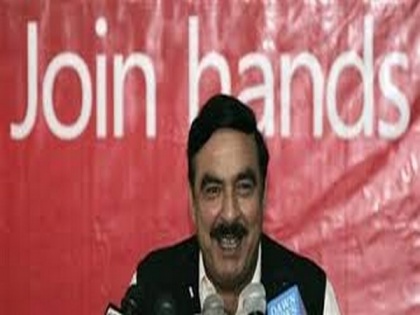Pak minister's disclosure on Kartarpur corridor exposes elemental dysfunctionality of country's govt: European think tank
By ANI | Published: December 7, 2019 09:04 AM2019-12-07T09:04:17+5:302019-12-07T09:15:07+5:30
Pakistan Railway Minister Sheikh Rasheed Ahmad's statement on the Kartarpur corridor exposes the elemental dysfunctionality of the country's government, as well as speaks volumes about how hollow and distorted its democracy is, a European think tank has said.

Pak minister's disclosure on Kartarpur corridor exposes elemental dysfunctionality of country's govt: European think tank
Pakistan Railway Minister Sheikh Rasheed Ahmad's statement on the Kartarpur corridor exposes the elemental dysfunctionality of the country's government, as well as speaks volumes about how hollow and distorted its democracy is, a European think tank has said.
In a statement released on Friday, Amsterdam-based European Foundation for South Asian Studies (EFSAS) said that Rashid's disclosure that the corridor was the brainchild of Pakistan Army Chief Qamar Javed Bajwa implicitly confirms the widely held view that the country's Prime Minister Imran Khan is "firmly under the thumb of the authority that 'selected' him".
"The perversity of the dynamics of governance in Pakistan was laid starkly bare by Rasheed. What he implicitly confirmed through his statement was the widely held view in Pakistan that Imran Khan was a 'selected' (as opposed to elected) Prime Minister who was firmly under the thumb of the authority that 'selected' him, the Army Chief, and that Khan was merely a rubber stamp for the decisions that the Army Chief dictated to him. It could have been more understandable if the statement made by Rasheed came from a man in uniform," the statement read.
"However, for an elected representative, a Federal Minister, and a close aide of the Prime Minister, to credit, without batting an eyelid, the Army Chief and not his boss, the Prime Minister, for the most mengful decision taken in recent times to improve relations with India, speaks volumes about the nature and scope of dysfunction in the Pakist State, as also about how hollow and distorted its 'democracy' is," it added.
EFSAS said that the statement irresponsibly inducted security and politics into what was essentially an issue of religious faith for millions of Sikhs. The think tank deemed the minister's suggestion -- that Pakistan had won over the Indian Sikh community by opening the corridor -- as "provocative" and "mischievous".
"As per figures released by the Pakist government's National Database and Registration Authority (NADRA), there were a mere 6,146 Sikhs registered in Pakistan in 2012. This figure has seen an upward revision since, but nowhere near enough to suggest that Sikhs constitute anywhere close to even 1 per cent of the Pakist population," the statement read.
"Sikhs, therefore, are a fringe group in the Pakist scheme of things, one that should possess neither the clout nor any intention to take up any Sikh cause larger than their own survival as a minuscule minority in Pakistan, especially given the country's abysmal record in the treatment of its minorities," it added.
EFSAS further said that the minister's statement illustrates that Pakistan has chosen to disregard the reality that the idea of Khalistan today has practically no takers, and in essence, has robbed the country of the higher ground that it could have stood on after unilaterally offering and subsequently providing its territory to Indian pilgrims despite the severe strains in bilateral relations.
( With inputs from ANI )
Open in app